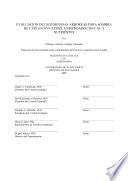Autores del Libro:
Resumen del Libro:

Coffee in Puerto Rico is cultivated mainly on Ultisols. These soils are characterized as having low fertility, acidity, high clay content and high erodability. To improve the fertility and reduce the erosion of these soils, several practices have been recommended, these include the use of trees as shade for coffee and the application of CaCO3 to increase soil pH. The purpose of this study was to evaluate the performance of 29 legume tree species in an Ultisol amended or not with CaCO3 plus a nutrient solution without nitrogen during six months. The pots were arranged in a split plot design with four replications. Amendments or not were the main plots and the 28 species the subplots. Plant height was evaluated monthly. Stem diameter, root length, root dry weight, plant total dry weight, nodule number, nodule dry weight and the Acetylene Reduction Assay (ARA) were evaluated six months after sowing. Results indicate that there was no response to the amendment for the majority of the species. The species that increased their monthly growth in the amended soil were: Leucaena diversifolia, Dalbergia sissoo and Erythrina poeppigiana. The nitrogen fixation capacity, measured by the Acetylene Reduction Assay (ARA), was higher for E. poeppigiana (4.94 nmol C2H4 plant -1 hour-1), Inga vera (3.59), Andira inermis (3.12), Samanea saman (3.03), Albizia procera (3.02) and Enterolobium cyclocarpum (2.81). Nodules of Acacia mangium and E. poeppigiana were more efficient with a specific nitrogenase activity of 14.40 and 14.28 nmol C2H4 dry weight-1 hour-1, respectively. Galls caused by nematodes where observed on the roots of 11 plants (73% belonging to Mimosoideae subfamily). These results must be validated in field experiments using different CaCO 3 and nutrient levels.
Formatos Disponibles: PDF / EPUB
Opciones de descarga:
Si deseas obtener una copia del libro puedes usar alguna de las siguientes opciones de descarga:
